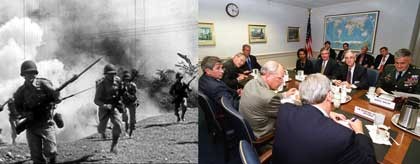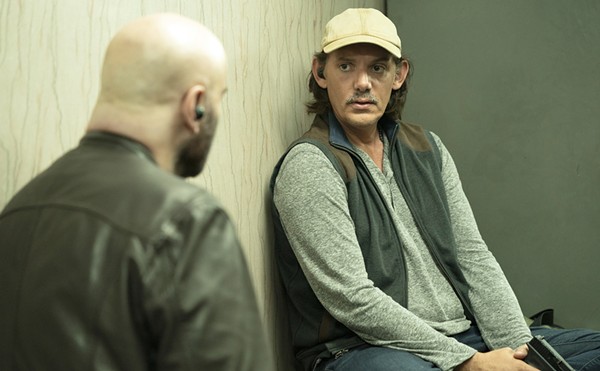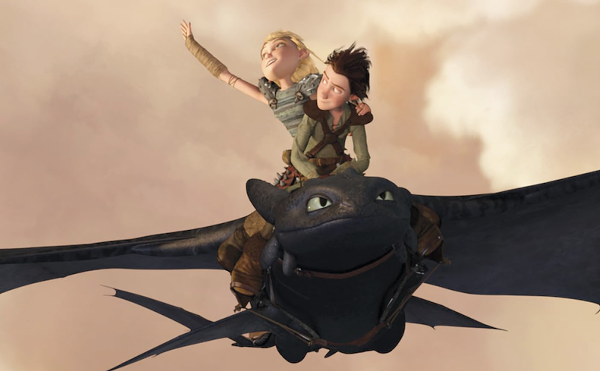The military-industrial complex Ike condemned leads America by the pocketbook
Why do we fight? To understand human aggression, we ought to consult the wisest philosophers, psychologists, biologists, and anthropologists. Instead, director Eugene Jarecki turns to Dwight Eisenhower, the second most tongue-tied president of the past 50 years. Why We Fight begins and ends with Ike’s speech of January 17, 1961, the farewell address in which the former five-star general speaks out against the growing menace of “the military-industrial complex.” A compilation of interviews and combat footage, Why We Fight answers the question implicit in its title by claiming that an insidious collusion of Pentagon officials, defense contractors, members of Congress, and think-tank consultants keeps the United States perpetually at war. “What you have,” says Dan Rather, unanchored and free to speak, “is a miniature version of what you have in totalitarian states.”
| Scenes from a bloody century: Troops under fire and the men who call the shots, including Paul Wolfowitz, at left. |
Why We Fight echoes the title of a series of propaganda documentaries that Frank Capra made to boost morale during World War II. It was, according to Jarecki’s film, the last “good war,” when Americans were united in a worthy effort. The fall from national innocence came with the destruction of Hiroshima and Nagasaki. “Truman wanted to drop the bomb to show off, to frighten Stalin,” explains Gore Vidal. Americans have since been confused about why we fight, though fighting continues to be this country’s most significant and expensive export. The defense budget is three-quarters of a trillion dollars, and $1.2 billion is spent annually to replenish the all-volunteer military. The cost in lives lost and wasted is incalculable. As Eisenhower explained in 1953: “Every gun that is made, every warship launched, every rocket fired, signifies in the final sense a theft from those who hunger and are not fed, those who are cold and are not clothed.”
“We live here in the United States of Amnesia,” quips Vidal, and, as a reminder that American interventions did not begin with the bombing of Baghdad in 2003, images of Lebanon, Laos, Congo, Grenada, and Panama flit across the screen. However, the United States was launching offensives long before the Pentagon was built or Halliburton bilked a taxpayer; the Philippines, Hawaii, Mexico, and tribal peoples bore the brunt of American imperial ambitions. And for all the prescience of his parting words and the reverential testimony of his son John and granddaughter Susan, Eisenhower was the Cold Warrior who presided over the creation of Fortress America.
Much of Why We Fight addresses easier questions. Where do we fight? “We must do everything we can to spread democracy and freedom throughout the world,” John McCain answers. When do we fight? Whenever. According to John F. Kennedy, “We shall pay any price, bear any burden, meet any hardship, support any friend, oppose any foe to assure the survival and the success of liberty.” How do we fight? With the most complicated and costly devices imaginable. One of those doing the imagining, scientist Anh Duong, explains how her escape from Vietnam led to a career designing weapons. Footage of civilian carnage illustrates the stupidity of “smart bombs.”
Bomber pilots recount a combat mission. “It’s not ours to decide,” says one. “We do what we’re told.” Explaining why Americans are told to fight others, Richard Perle insists: “You have to remove the obstacle to democratic change.” But, convinced that oil is the lubricant of contemporary slaughter, Charles Lewis counters: “It’s basically economic colonialism.”
| Why We Fight Dir. & writ. Eugene Jarecki (PG-13) |
A polemic not likely to change minds or pump hearts, Why We Fight lacks the drama of Fahrenheit 9/11 or the pathos of The Fog of War. Yet two figures give it life. Wilton Sekzer, a retired sergeant in the New York Police Department, recalls watching the World Trade Center collapse while knowing that his son Jason was inside. “Somebody ought to pay for this,” he declares and persuades the Department of Defense to inscribe “Jason” on a bomb dropped on Iraq. But when George W. Bush concedes no connection between 9/11 and Iraq, Sekzer is furious. A Vietnam veteran who had never questioned Pentagon policy, he concludes: “There’s something wrong with the entire system.”
Karen Kwiatkowski undergoes a similar transformation. A retired lieutenant colonel, she was working in the Pentagon when it was commandeered by political appointees loyal to the military-industrial complex. “If you join the service now,” says the career officer, “you are not helping defend the United States of America.” Jarecki gives Kwiatkowski the final words: “Too many people are not standing up saying we’re not doing this anymore.” His film is a manifesto for Why We Won’t Fight. •
















